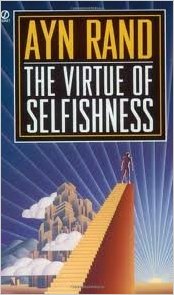|
The Virtue of Selfishness
by Ayn Rand Published in 1964 173 Pages Thibault’s Score: 3/5 While there were some nuggets of gold, overall I was not impressed. “If man holds life on earth as the good, if he judges his values by that which is proper for the existence of a rational being, then there is no clash between the requirements of survival and of morality. No clash between making himself able to live and making himself worthy of living. He achieves the second by achieving the first. But there is a clash if man holds the renunciation of this earth as the good, the renunciation of life, of mind, of happiness, of self.” - Ayn Rand Ayn Rand does a great job at destroying the tenets of both altruistic morality and mystical morality, although I think she fails at constructing an adequate replacement. Ayn Rand makes some important arguments. For example, she rejects moralities which concern themselves with a mystical metaphysical world that is disconnected from reality. She stresses the importance of grounding morality in concrete material objects, and illustrates the dangers of mystical moralities. The subjective nature of mysticism makes it much easier for tyrants to pervert and control morality for their own purposes, while the concrete world is much harder to alter. I have numerous problems with this treatise. She makes bold declarations but never defines any of the most important terms such as ethics, Ayn Rand’s critique of Nietzsche is pedantic. Ayn Rand writes that “Nietzschean egoists [are a] product of the altruistic morality and represent the other side of the altruist coin: the men who believe that any action, regardless of its nature, is good if it is intended for one’s own benefit.” Egoist Darwinism is literally the opposite of altruism. She is obsessed with copywrite and includes a ridiculous disclaimed about Nathanial Brandon saying she isn’t associated with him (because it was discovered she had an affair with him). Ayn Rand’s arguments against altruism border on the pathological. She argues that a man who spends all of his hard earned fortune on curing his sick wife is acting in self interest to keep her alive and avoid sadness. Altruism, like all other parts of the human experience, evolved biologically as a mechanism to protect one’s genes and tribe. If Ayn Rand had been writing in a later age, she would have probably had a better understanding of the genetic implications of selfishness. “Any action a man undertakes for the benefit of those he loves is not a sacrifice if it takes a higher place in the hierarchy of values in the total context of choices open to him - it achieves that which is of greatest personal and rational importance to him.” Ayn Rand makes important arguments, and touches on many important points, especially when it comes to arguing against opposing theories. She falls short when it comes to building positive moral theories. Proof is that Ayn Rand died alone and miserable. If her theories had worked better, and if she had been more genetically altruistically, she might have instead died with the company of a lover, and with children to pass on her biological legacy. I think that Ayn Rand is a worthy read, but the Virtue of Selfishness is far from her greatest work. I don’t recommend this book, and instead recommend the three classics Anthem, the Fountainhead, and Atlas Shrugged.
0 Comments
Leave a Reply. |
Thibault SerletMost of my articles are book reviews, but I also write about many other topics. Archives
December 2023
Categories |

 RSS Feed
RSS Feed